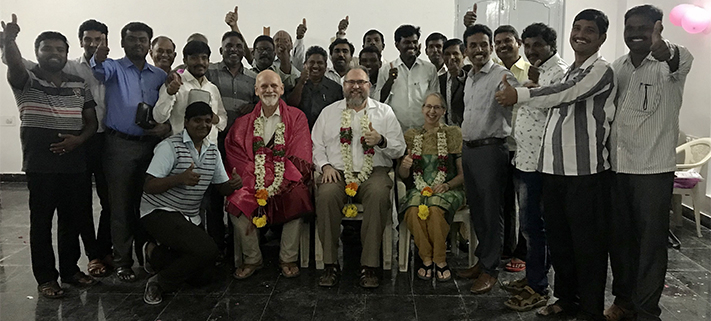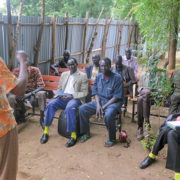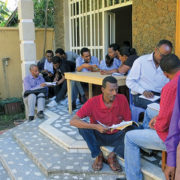Spiritual unity in South Asia
The Pastoral Studies Institute (PSI) of Wisconsin Lutheran Seminary, in partnership with WELS Joint Missions, guides and assists spiritual leaders around the globe through their pre-seminary and seminary training. The PSI connects with these spiritual leaders through WELS world mission work and through outreach to immigrants and refugees in the United States and Canada. They are able to evaluate and serve these international groups and synods that want support, training, and a connection to a church body that shares the gospel message in its truth and purity.
E. Allen Sorum, director of the Pastoral Studies Institute, traveled to a country in South Asia in December to teach Ephesians and 1 Peter. Read more about his experience:
For two and a half weeks, I had skated over icy sidewalks in Novosibirsk, Russia. I was looking forward to my next teaching assignment in a country in South Asia. Average temperature? 85 degrees! As we drove from the airport to the seminary facilities, I was second-guessing my choice of wool socks for this day of travel between Siberia and South Asia.
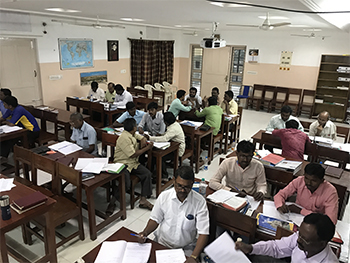
Seminary in South Asia
Later that first day, I got to sit in on a staff meeting with the WELS friendly counselor and the three spiritual leaders that serve with our friendly counselor to administer the seminary training program. The meeting began with a wonderful reflection on a passage from Scripture that featured deep insights and highlights from the Greek text. This was not a hasty “let’s-open-with-a-religious-thought” devotion! Everyone sitting around that table was clearly enjoying time in God’s Word, mutual encouragement, and a partnership in the gospel. The meeting that followed displayed an excellent partnership between local leaders and our friendly counselor. These men impressed me!
It will be challenging to describe the South Asian leaders who work with our friendly counselor in this place; security realities won’t allow familiarity. But here are three men who obviously hail from the same continent. After that, commonalities are more difficult to see. These guys have strong and independent personalities. Their differences were clearly evident to me when they took their turn translating my lessons for the 25 students before us.
One of these guys didn’t just translate. He ran the class. I mean he allowed only one speaker at a time. Side conversations was strictly forbidden. And the amount of time he took to convey my sentences in his language was about the same length of time it took me to say my sentences in English.
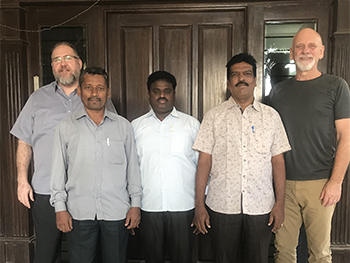
WELS Friendly Counselor (left) with the three South Asian leaders and E. Allen Sorum (right)
The second chap relished in the kind of class mayhem that I rather prefer myself. When I placed a question before the men, it seemed their natural style was to all answer at exactly the same time at an above average volume. Somehow, this translator was able to synthesize a group answer and share it with me in a way that was both entertaining and helpful. This leader/translator used my English sentence as a launching point for additional points that he wanted to add to my original point. At least that’s what I think was going on when my one sentence in English became his one paragraph in Telegu. He was greatly enhancing the learning that was going on in that room, I am sure.
The third man took my wimpy, timid English sentences and turned them into powerful oratory. He wasn’t content to merely instruct. He wanted to encourage, rally, and motivate his co-workers. All of my translators were themselves pastors. They know the challenges these men face back home in their young congregations. Most of the students were already pastors. They were, in general, just getting started at ministry, trying to establish a Christian movement in a hostile environment.
These three spiritual leaders who were also pastors, partners with our friendly counselor, seminary administrators, and translators share another attribute: they care deeply for their students. Spiritual unity is a hard thing to establish and maintain in any place. But when there is a bond of peace and love in Christ, and a good dose of humility, unity has a chance. We talked a lot about this unity: unity of faith, unity of love, and unity of purpose.
The friendly counselor who is blessed with the task of overseeing this ministry asked me to teach Ephesians and 1 Peter; fitting texts for these men and their ministry settings. When we got to the spiritual warfare portion of Ephesians 6, I asked the men to raise their hand if they dealt with demon possession. Almost every man raised their hand. We enjoyed, therefore, a spirited discussion on a Lutheran approach to exorcisms; Lutheran as opposed to Pentecostal. The students agreed that the Pentecostal approach common among them seemed more interested in ascribing glory to the exorcist than to serving the (possibly) possessed individual.
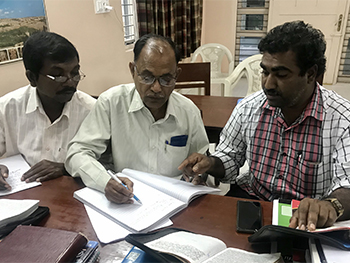
The Lutheran approach acknowledges the obvious. It is Jesus who has power and authority over the universe including the spirit world. So we ask Jesus to remove demons, we see ourselves as his agent carrying out his mission to rescue people, and we give him all the glory.
I was impressed by these men who must carry out their mission in these circumstances. I was impressed by their thirst for truth and their gratitude for partnership with their fellow Christians of WELS. They articulated their appreciation for WELS Christians many times. I assured them that their WELS brothers and sisters appreciated our partnership with them. I articulated that many times. May God strengthen our unity through the bond of peace and love in Christ. May we be a blessing to each other.
Written by Rev. E. Allen Sorum, Director of the Pastoral Studies Institute (PSI)
To learn more about the Pastoral Studies Institute, visit wels.net/psi.
WELS Missions
Learn about the ministry work of WELS Missions.
SUPPORT MISSIONS
Support the ministry work of WELS Missions.
[fbcomments num=”5″]

